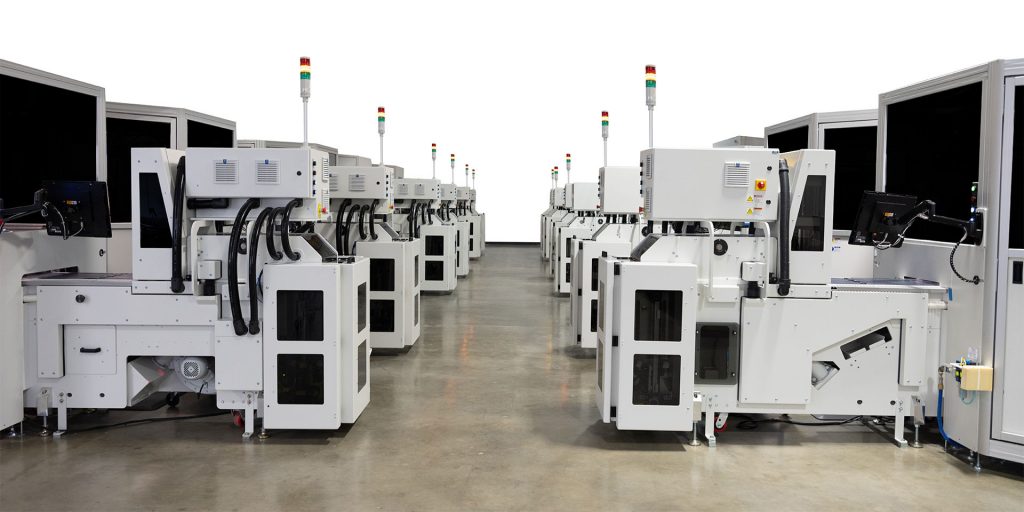Ripcord, a startup developing robots that can automatically digitize paper records, is hoping to raise $20 million to $25 million in a new funding round that would value the company at $110 million pre-money, according to a source familiar with the matter and a pitch deck viewed by TechCrunch.
Alphabet’s GV, Lux Capital and MUFG are in talks to participate in the round. GV and Lux previously invested in Ripcord; MUFG, a Japanese bank chain, appears to be a new backer.
We reached out to Ripcord’s marketing director, Molly Vernarecci, via LinkedIn for comment. She didn’t respond by publication time.
However, Ripcord’s CEO, Sam Fahmy, got in touch via email, and said that the current round is closer to $35 million — $20 million of which is already closed, including a $8.5 “bridge note” from March, he claims.
The round, if successful, would bring Ripcord’s total raised to around $150 million — the bulk of which came from previous investors Kleiner Perkins, Silicon Valley Bank, Tyche Partners, Icon Ventures and Baidu. Notably, Steve Wozniak, the Apple co-founder, participated in Ripcord’s series A.
The new round would also be significantly smaller than Ripcord’s last tranche, a Series B, which closed at $45 million. The reason wasn’t immediately clear — nor was the reason for the relatively lengthy gap, three years, between Ripcord’s outside infusions.
Ripcord has found itself at the center of controversy before, which could have something to do with it.
In 2018, former Ripcord employee Perry Coneybeer alleged improper behavior by then-CEO Alex Fielding and several other unnamed employees. In a Medium post, Coneybeer claimed that Fielding told graphic, sexually-tinged stories and made crude remarks about her breast milk pumping — and that she was retaliated against for reporting an employee’s inappropriate sexual behavior to HR.
In response to the allegations, Ripcord said that its board of directors would investigate and “take appropriate action.” Three years later, Fielding became the director of the board — a position he retained for two and a half years before leaving Ripcord to found space startup Privateer.
Fahmy joined in January 2022.
In the pitch deck shared with TechCrunch, Ripcord claims to have secured a “pivotal deal” with the IRS for tax document processing worth over $4 million and an expanded deal with the U.S. Air Force. MUFG is a customer in addition to being an investor, the pitch deck reveals, with an annual contract value of $5 million. And Ripcord says it’s in the final stages of a large deal with Wells Fargo.

Image Credits: Ripcord
In 2020, Ripcord claimed to be processing over 1 billion pages per year for customers like Coca-Cola, BP, Chevron, UCLA, Cantium and a number of Fortune 100 companies — including three of the top five financial services companies and three of the top five insurance carriers. Coca-Cola remains a customer, according to the pitch deck. But the status of several of the others is unclear.
Nevertheless, Ripcord’s revenue was $11.8 million in 2022, up from $5.9 million in 2021, per the pitch deck. The company, which isn’t currently profitable, expects to end 2023 with $22.5 million in revenue — and reach $49.2 million in revenue by Q4 2024.
Ripcord was founded by three entrepreneurs, Fielding (a former Apple engineer), Kim Lembo (a NASA veteran) and Kevin Hall. The company develops physical robots that autonomously scan documents, even removing staples. Through partnerships with logistics firms, Ripcord transports files containing barcoded labels with metadata to its facilities — one in the U.S., specifically the Bay Area, and two in Japan — where it scans them and either stores them to meet compliance requirements or shreds and recycles them.
Ripcord makes money by charging for document scans, about $0.08 to $0.25 per image. But a significant portion of its revenue also comes from “applying tech, including machine learning and generative AI, to understand and validate the data in the scanned docs,” Fahmy says.
Employing computer vision, lifting and positioning arms, and RGB cameras, Ripcord’s robots are able to handle a range of document formats while classifying and extracting data. On the software side, the company’s platform, which integrates with a range of third-party business intelligence and data processing software, uploads documents to the cloud and converts them to searchable PDFs.
To fuel its next phase of growth, Ripcord — fresh off of an integration partnership with OpenAI — is developing a generative AI tool that the startup had intended to launch in September, according to the pitch deck. Called Docufai, the freemium tool is designed for document discovery, providing a way for customers to ask questions about scanned documents and get answers.
The pitch deck shows Ripcord’s proposed product roadmap for Docufai, which includes a future document translation feature, a capability to find related documents and sharing features including a collaborative notebook. Ripcord aims to onboard 1,000 users to Docufai by the end of Q3 2023 and release a paid tier — followed by teams and enterprise tiers — at some point in 2024.
Docufai is now expected to launch sometime in October or early November, Fahmy says.
